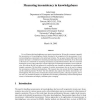58 search results - page 7 / 12 » A Type-Theoretic Framework for Formal Reasoning with Differe... |
NMR
2004
Springer
14 years 24 days ago
2004
Springer
The development of Logic Programming and Defeasible Argumentation lead to Defeasible Logic Programming. Its core resides in the characterization of the warrant procedure. Defeasib...
JACM
2010
13 years 5 months ago
2010
Description logics (DLs) and rules are formalisms that emphasize different aspects of knowledge representation: whereas DLs are focused on specifying and reasoning about conceptual...
ENTCS
2006
13 years 7 months ago
2006
Conventional approaches to the modeling of autonomous agents and agent communication rely heavily on the ascription of mental properties like beliefs and intentions to the individ...
JIIS
2006
13 years 7 months ago
2006
It is well-known that knowledgebases may contain inconsistencies. We provide a measure to quantify the inconsistency of a knowledgebase, thereby allowing for the comparison of the...
CACM
2010
13 years 4 months ago
2010
Certified software consists of a machine-executable program plus a formal machine-checkable proof that the software is free of bugs with respect to a claim of dependability. The c...

